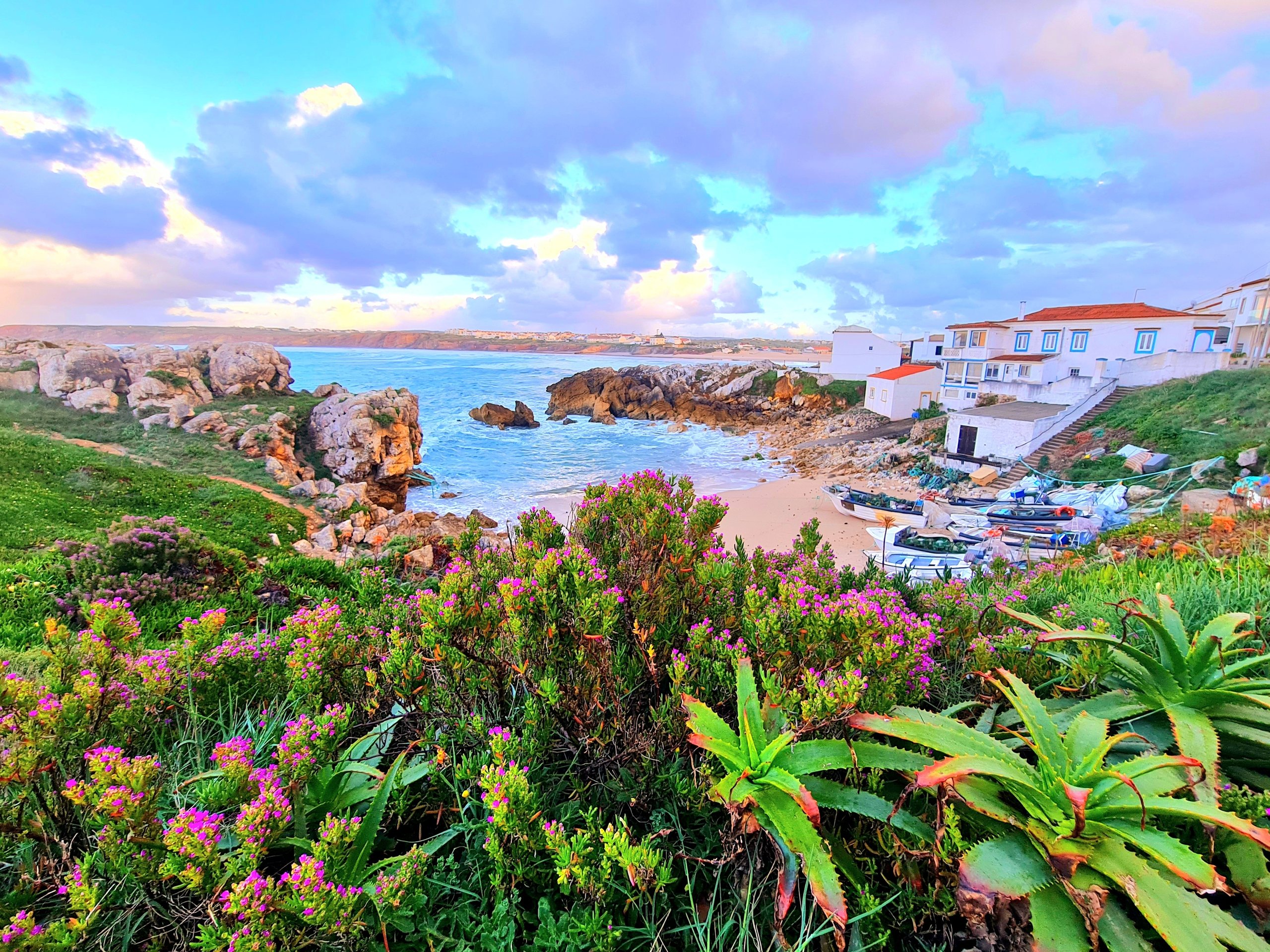Considering a move to Portugal or planning to spend a significant amount of time there? Learning Portuguese isn’t a nice-to-have, it’s essential if you want to truly settle in, feel connected and enjoy more meaningful experiences. While many locals speak English, especially in cities and coastal areas, if you learn to speak Portuguese even to a basic level it can transform everyday interactions and opens up a whole new world socially, culturally and practically.
That said, European Portuguese can be a challenge, especially for English speakers. It’s full of unique sounds and phrases that don’t always match up with written words. Even more, it varies depending on where you are in the country. But don’t be discouraged – even small efforts are met with big rewards here.
In this article, we’ll share practical steps to help you get comfortable with the language, from choosing the right learning method to dealing with quirky regional dialects and real-life situations.
Contents
- Why bother to learn to speak Portuguese?
- Get started before you move
- Tools and courses that work to learn to speak Portuguese
- Understanding pronunciation
- European vs Brazilian Portuguese
- Regional dialects in Portugal
- Practise with confidence
- Real-life opportunities to learn to speak Portuguese
- FAQs about learning Portuguese in Portugal

Why bother to learn to speak Portuguese?
If you’re planning on more than a brief stint in Portugal, learning the language will dramatically improve your daily life. From making friends and understanding local humour to dealing with a plumber or reading bureaucracy-heavy council letters, speaking some Portuguese is incredibly empowering.
While many Portuguese people speak excellent English, assuming you can get by without learning the language may distance you from the local community. Owning property, making long-term plans or starting a business is all much easier when you’re not relying on Google Translate at every turn. Daily life becomes smoother, and people truly appreciate the effort. It shows respect and opens the door to far warmer, more authentic connections in your new neighbourhood.
Even knowing how to ask for the queue in the pastelaria goes a long way. Locals will often smile and switch to English out of kindness, but they tend to value your trying first. And out in the countryside? English is much rarer.
For a closer look at the purchasing process, make sure you grab your copy of our Portugal Buying Guide:
Download the Portugal Buying Guide
Get started before you move
The biggest regret many expats share is not learning some Portuguese before arriving. Once you’re unpacking and dealing with utilities, estate agents or the câmara municipal (town hall), you’ll thank your past self for doing the prep work.
Start by gearing your home to language learning. Label appliances and cupboards with their Portuguese names using sticky notes. Swap your music playlist with beginner language podcasts or audio courses during car journeys. Apps like Duolingo, Pimsleur or Babbel can also help get you into good habits.
Try reading Portuguese news sites with the help of browser-based translators. You’ll quickly spot common words and sentence patterns. Don’t worry about mistakes or sounding silly – language learning is about consistency, not perfection.
Bonus tip: master a few high-usage expressions before you travel. Words like “desculpe” (sorry/excuse me), “com licença” (excuse me/coming through), or “já pedi” (“I’ve already ordered”) instantly make you sound more competent than you may feel.
Tools and courses that work to learn to speak Portuguese
Once in Portugal, you’ll find a broad choice of language lessons, but not all are created equal. Local councils sometimes offer free or subsidised classes geared at newcomers, although these often focus on textbook-style grammar rather than practical usage.
If you prefer a flexible approach, online lessons via platforms like italki let you connect with native-speaking tutors for casual conversation or structured lessons. You can learn at your own pace and home in on what’s useful to your lifestyle. Fancy talking about wine? Gardening? Immigration forms? You can tailor it all.
Many expat-friendly areas also offer group lessons in community centres or local cafés. These are especially helpful for beginners looking to practise in a safe, encouraging setting. Make sure your tutor teaches European Portuguese, and not the Brazilian variant – more on that shortly.
If you’re investing your time and money, make sure the lessons reflect the everyday language you’ll use. Role-play ordering at a café or explaining a boiler problem – not just verb conjugation tables.
Understanding pronunciation
The biggest challenge for many English speakers learning Portuguese is dealing with the way it’s pronounced. European Portuguese isn’t always phonetic and includes nasal sounds, soft consonants and silent letters that may trip you up at first.
For example, “bom” (good) looks deceptively simple, but is said through the nose – more like “bong.” And “de” (of) becomes more like “dzh” or “je” depending on context. Even if you know the vocabulary, speaking it correctly will make all the difference between being understood or not.
YouTube channels like “Practice Portuguese” or free podcasts like “Portuguese With Carla” are goldmines for hearing how it’s really spoken. Repeating what you hear aloud can help train your ear and mouth to produce these unfamiliar sounds. Whisper it at home, speak it in the shower – whatever works.
Listening is just as important as speaking. The more you tune in to Portuguese radio or TV, the faster you’ll start to instinctively understand and imitate what you hear. Over time, you’ll find your brain auto-adjusting without realising.
European vs Brazilian Portuguese
Portuguese may be spoken in multiple countries, but you’ll soon notice key differences between the European and Brazilian versions. Yes, they share vocabulary and grammar, but everything from pronunciation to expressions sets them apart.
European Portuguese – the one spoken in Portugal – tends to use more muted tones and contractions. It’s often described as the “quieter cousin” of the more melodic Brazilian Portuguese. For instance, “thank you” in Brazil sounds like “obrigado” with all the vowels pronounced clearly. In Europe, you’re more likely to hear it clipped – almost like “’brigado.”
Many online resources, including the popular Rosetta Stone and Duolingo, teach Brazilian Portuguese by default. This can be confusing when you arrive and locals don’t recognise your carefully practised phrases. Make sure any course or tutor you choose specialises in European Portuguese to save yourself learning things you’ll only have to unlearn.
You want to learn how people speak where you live – not on the other side of the Atlantic.
Regional dialects in Portugal
After struggling to master Portuguese, it can be a shock when your understanding crumbles just by driving into another district. That’s because Portuguese is sprinkled with regional accents and quirks across the country.
The Algarve is a good example. Southern pronunciation often drops letters from the beginning or end of words and slurs syllables into one another. To learners, locals can sound like they’re mumbling or skipping sections altogether. Once you’re used to Lisbon-style pronunciation, this can feel like deciphering a new language.
In contrast, up north, the accent tends to be more crisp. Many learners find it easier to pick up. The Açores and Madeira each have their own spoken variations too.
Accept that your Portuguese will adapt to your region. Much like someone from London learns different conversational habits in Newcastle, you’ll absorb characteristics from wherever you settle. Embrace it – it means you’re becoming part of the community.
Practise with confidence
Being afraid to make mistakes is the biggest barrier to progress. No one gets fluent without looking silly along the way. That said, locals usually love when you try – even badly – and enjoy helping you out.
Try to start every interaction in Portuguese. You might only get a few sentences in before your conversation partner switches to English, but those moments count. Smile, be open and ask them to correct you – even laugh along with your errors. Most people will be happy to oblige.
Making friends with Portuguese neighbours or coworkers provides a relaxed and low-pressure space to practise. Ask them to slow down if needed and don’t be shy about repeating what they’ve said back to check your understanding.
The more you persevere, the more you’ll improve. And every success – even ordering your café da manhã without stumbling over your words – builds your confidence.
Real-life opportunities to learn to speak Portuguese
Life in Portugal throws up endless learning moments once you’re tuned in. Visiting your local council office (câmara municipal) to sort paperwork? Use that time to observe the language used over the counter. Take mental notes of sentence structures and key verbs.
What about chatting with your butcher, postman or hairdresser? These everyday exchanges are real-world gold. Phrases stick better when tied to an emotional experience – even if it’s just the stress of being asked if you want your fish skinned or not.
Markets, bakeries and local events are also excellent for immersion. If you’re a social learner, consider weekly language exchanges – informal meet-ups where foreigners and locals mix over coffee or wine. It helps shift language out of a learning box and into your lived life.
Most expats agree: there’s no substitute for getting stuck in. Mistakes are simply proof you’re doing the hard part – showing up and trying. And in the end, that’s how fluency is built: not through perfection, but persistence.
Want more help navigating life in Portugal? Speak with our local experts to start planning your overseas future.
FAQs about learning Portuguese in Portugal
While many locals speak English, especially in cities and tourist areas, learning Portuguese makes daily life easier and helps with integration. Even basic language skills show respect and open the door to more authentic experiences.
European Portuguese is spoken in Portugal and features more muted tones and contractions than Brazilian Portuguese. Many popular language apps focus on Brazilian Portuguese, so it’s important to choose resources specific to the European variant if you plan to live in Portugal.
According to the US Foreign Service Institute, Portuguese takes around 600 hours to learn to a conversational level. With consistent daily practice, many learners reach basic fluency in about a year.
Apps like Duolingo, Babbel and Pimsleur are good for beginners. Listening to podcasts, labelling household items, and practising key phrases before your move can help build a strong foundation. Language exchanges and online tutors are also effective.
Yes. Portugal offers free or subsidised local classes, community groups, and private tutors. Practising with neighbours, shopkeepers, and during everyday errands also provides real-life learning opportunities.









